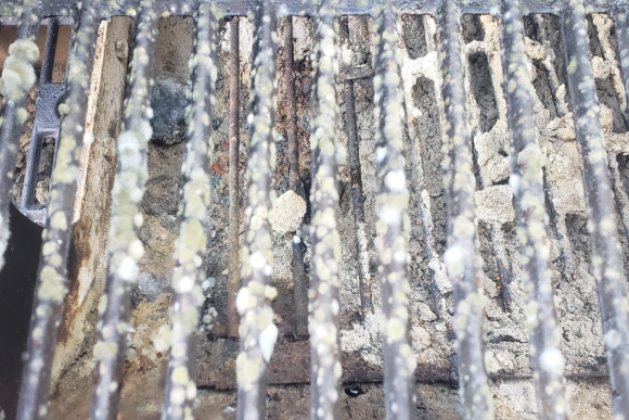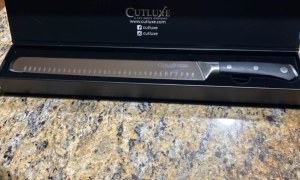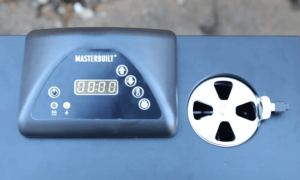Nothing defines summer better than some cooked food on the grill. However, uncovering the grill after a cozy winter can bring a few unwanted and unwelcome surprises, such as mold. Does mold on your grill pose a sickness risk?
Even though some people might have sealed the grill with a protective plastic cover before storing it away, it may be protected from rust but is still subjected to mold. Mold is the most different and the worst type of nightmare and is even more challenging to get rid of than rust or bacteria.
If the grill’s surface has a moist and warm spot, mold will effortlessly find its way to the grill regardless of how much the airflow has been restricted or limited. Therefore, this comprehensive guide aims to find out does mold on your grill pose a sickness risk.
Does Mold On Your Grill Pose A Sickness Risk
Understandably, uncovering the grill despite encountering the surface covered with mold, you may be tempted to fire it up and cook, relying on the immense heat to kill the moldy surface, but this is not wise.
Before doing so, you should have an appropriate answer and must be aware of whether does mold on your grill pose a sickness risk. You must avoid cooking on a moldy grill at all costs because it can pose a sickness risk. Upon use, a toxin substance known as mycotoxins is released, which is severely harmful for humans and results in life-threatening diseases.

Recent research has shown that filthy grills, smokers, BBQs and moldy grills contain a lot of bacteria. To state it more explicitly and precisely, a study in Britain has determined that the average moldy, dirty grill houses twice as many germs and bacteria than a toilet seat.
When these bacteria particles are to remain and left to be spoiled on the grill’s surface, they eventually begin to grow and transform into mold. Coming in contact with a moldy BBQ of grill can have symptoms ranging from mild to severe, per an individual’s immune system.
Some of the common symptoms are the following:
- Itchy throat and nose
- Sneezing
- Shortness of breath
- Itchy and water eyes
- Runny or stuffy nose
- Postnasal drip
- Chest tightness
- Wheezing and coughing
- Scaly and dry skin
Apart from how mold can affect people only through contact, it will also taint the food cooked on the grill, ensuring that the food has a bitter flavor regardless of the wood or the coals you may use as fuel.
What Is A Grill Mold?
Mold is typically referred to as fungi that grow in a threat-like or multi-cellular form. The molding of your grill is a natural phenomenon and is bound to occur if your grill is stored in areas with high moisture and poor air circulation.
Also, mold can be featured on a grill in different colors such as white or black, different types, and in varying textures or smells. This build-up of grease and moisture together can taint food’s flavor if cooked on a moldy grill.

What Causes Mold On Grill?
The most usual cause for the development of mold on a BBQ grill is storing it under a grill cover or in a moist area. Though covering the grill before storing it can prevent the grill’s rusting, it is of no use for the grill to prevent mold and can often constitute a cause for the mold to grow.
This happens because, with time, the trapped moisture under the lid and inside the grill creates a perfect and ideal environment for the mold to grow and breed.
Is Mold On The Grill Dangerous?
Mold growing on a grill is dangerous and compromises your food’s safety. Hence, it is crucial that as soon as you spot some signs of mold, you address the cause of its emergence and immediately clean the mold off.
Otherwise, when food is cooked on a grill with its surface coated in mold, the spores coming in contact with the food will taint and spoil the food’s flavor and result in health issues. In worst-case scenarios, consuming food cooked on a moldy grill could also lead to illness.
Along with cleaning and maintaining the grill regularly, it is equally important that you also inspect the grill to identify any signs of mildew or mold.
Can You Burn Mold Off A Grill?
Some people, despite knowing they have a moldy grill, choose to cook on it, assuming that the high heat temperatures will burn the mold off the grill’s surface. This, therefore, is a very effective and ideal method to eliminate mold.
You can do this by cranking the grill at the maximum temperature and maintaining it for at least now. During the span, increase the gas burner’s temperature to its highest capacity or add new and fresh charcoal to keep it lit to the charcoal grill.

After some intense exposure to the heat, the built-up food particles on the grill will start to shed off by themselves. You should work on cleaning the interior with a plastic putty knife and scrape all the excess grease, charcoal, and food particles away from the surface.
This thorough scraping will ensure no breeding ground left for the mold to grow again. Next, dry the interior to cover it later with the lid. Again, before placing the lid, remove the side pieces and open the grill’s vents so that all the air that the interior was previously exposed to can be retracted, and no moisture serves as a leftover and nurturing platform for the mold.
Getting Rid Of Mold
One way to keep your food delicious, edible, and safe for consumption is by ensuring that the grill is kept mold-free. For this, you can opt for several methods, such as cleaning regularly or indulging in an extraordinary cleansing of the moldy grill.
But before begin the cleaning process, ensure safety comes first. This is crucial because when you are removing mold from the grill, it can release various types of spores into the air. If you are not properly protected, and you inhale these spores, there is a high chance of getting sick. It is recommended to use a face mask that fits snugly against the skin. Attempt to conduct this task away from your home; you can remove grill mold outdoors or in the backyard, which helps protect your family, especially children.
Cleaning With Stiff Brush

A conventional method to remove the mold is by cleaning and scraping mold and any visible signs on the grill with a stiff brush. So, remove the lava rocks, ceramic briquettes, charcoal, or other porous type materials from your BBQ grill. To make the process less time-consuming, add some elbow grease and then scrub the grill away to remove mold, preventing it from causing and spreading health problems.
If elbow grease isn’t sufficient, you could use a wire brush, grill scraper, or pressure washer, which can make it easier for you to scrub and scrape your grill.
Use cleaner
Try to avoid using chemicals for cleaning because at high heat, chemicals can alter the flavor of your smoked meat food. It’s better to create a solution of baking soda and water, then apply it to the grill grates using a basting brush or stiff brush.
sing wire brushes, pressure washers, or grill scrapers, scrub and scrape your grill. You could use elbow grease if you do not have access to pressure washers.
Grill Maintenance
Some people might prefer to occasionally clean the grill off the mold, whereas others may maintain their grill by regular inspection for damage or wear and tear that could be a spreading mold.

Specifically, look out for any grime and grease buildup and aim to remove them. You must have a good quality cleaning brush and a cleaning detergent that effectively removes stuck-on residue. Likewise, purchase a de-grease to clean off all the nooks and crannies of the grill.
If you clean your grill properly and take adequate care of it, no mold will ever grow on the surface, and the grill will also stay durable and in good condition to be used over the coming years.
Bleach Soaking

Let’s say you have scrubbed off all the mold visible on the grill’s surface but are still skeptical about contamination from materializing, resulting in mold growth. Soak your grill in a beach solution. The soaking of the grill will make sure to kill the bacteria and also eliminate any mold spores that might not have been scrubbed off.
It is a successful proposed method to leave no room for even the slightest mold growth to occur.
How To Prevent Mold?
Mold thrives in grills that are left unused for extended periods, providing the perfect breeding ground. One effective way to avoid grill mold is to avoid using a lid or cover (you may be surprised, but it is the cause of mold), but rather consider storing it in a suitable place such as a shed or a covered area.
Another method to prevent mold, also recommended by most experts, is to superheat the grill after cooking. This burns off all the leftover food particles and grease in the pan, inside the lid, or on the grates.
Proven Techniques for Mold Removal from Grills
Quick Remove Mold:
For a quick solution, you can also opt for a replacement grill plate. However, cleaning it requires a bit of effort and just half an hour to remove solids. This method is one I primarily use in my charcoal smoker about 4-5 times a year. When I clean it, here’s what I do: I start a gas Burner and place the grills (or the part from which I want to remove mold) over it. I wait until they’re hot and then use a wire brush to scrub them, but only in one direction. The reason behind this is to prevent the metal from wearing out and to stop any brush pieces from sticking to the grill. Afterward, I spray the grills with oil and rub them with newspaper. This way, I can quite easily get rid of any mold and make them look shiny and new again.
Grill Cleaning and Seasoning
Separate the plate from the grill and soak them in vinegar. After a while, use steel wool or stainless steel wool/scouring pads to easily scrub off the solids, even creosote in smokers can easily be removed. Once they are completely dry, coat them with high-heat oil (such as avocado, peanut, canola, sunflower, or sesame oil). After it cools down, place it back on the grill and turn the oven’s high heat to 450 degrees F. Once it reaches 450 degrees F, turn it off and let it cool down. After that, it can also be easily stored in the house when not in use.
Wrap it up
Now that you are well-informed about whether mold on your grill pose a sickness risk, you should avoid using a moldy grill at all costs. Even if you are speculating about using a moldy grill, consider its risks, and then clean the mold off before putting the grill to use. If you feel unsafe, you can also call a professional grill cleaning service. Their team will come to your home and tackle the tough, hard-to-clean particles by scrubbing, vacuuming, and using steam to clean the grill. This method is not only safer for your health but also ensures your barbecue grill is thoroughly cleaned and ready for use.



[…] grills generally require regular cleaning, especially to remove ash and prevent rust. While the maintenance costs are usually not high, it’s important to keep in mind that parts like […]